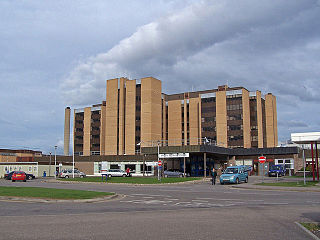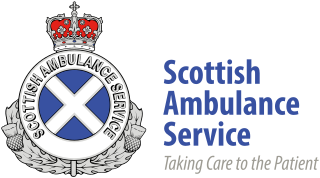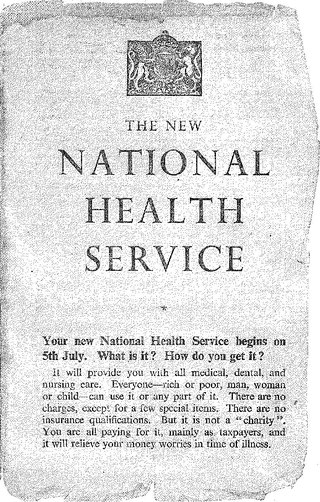Health care in Ireland is delivered through public and private healthcare. The public health care system is governed by the Health Act 2004, which established a new body to be responsible for providing health and personal social services to everyone living in Ireland – the Health Service Executive. The new national health service came into being officially on 1 January 2005; however the new structures are currently in the process of being established as the reform programme continues. In addition to the public-sector, there is also a large private healthcare market.

Raigmore Hospital is a health facility located in Inverness, Scotland. It serves patients from the local area as well as providing specialist services to patients from across the Highland area. It is a teaching hospital, educating a range of healthcare professionals in association with the Universities of Aberdeen and Stirling. It is managed by NHS Highland.

The Scottish Ambulance Service is part of NHS Scotland, which serves all of Scotland's population. The Scottish Ambulance Service is governed by a special health board and is funded directly by the Health and Social Care Directorates of the Scottish Government.

NHS Scotland, sometimes styled NHSScotland, is the publicly funded healthcare system in Scotland and one of the four systems that make up the National Health Service in the United Kingdom. It operates 14 territorial NHS boards across Scotland, supported by seven special non-geographic health boards, and Public Health Scotland.
Health and Social Care (HSC) is the publicly funded healthcare system in Northern Ireland. Although having been created separately to the National Health Service (NHS), it is nonetheless considered a part of the overall national health service in the United Kingdom. The Northern Ireland Executive through its Department of Health is responsible for its funding, while the Public Health Agency is the executive agency responsible for the provision of public health and social care services across Northern Ireland. It is free of charge to all citizens of Northern Ireland and the rest of the United Kingdom.

Emergency medical services in the United Kingdom provide emergency care to people with acute illness or injury and are predominantly provided free at the point of use by the four National Health Services (NHS) of England, Scotland, Wales, and Northern Ireland. Emergency care including ambulance and emergency department treatment is only free to UK residents and a charge may be made to those not entitled to free NHS care.

Healthcare in the United Kingdom is a devolved matter, with England, Northern Ireland, Scotland and Wales each having their own systems of publicly funded healthcare, funded by and accountable to separate governments and parliaments, together with smaller private sector and voluntary provision. As a result of each country having different policies and priorities, a variety of differences have developed between these systems since devolution.

The National Health Service Act 1946 came into effect on 5 July 1948 and created the National Health Service in England and Wales thus being the first implementation of the Beveridge model. Though the title 'National Health Service' implies a single health service for the United Kingdom, in reality one NHS was created for England and Wales accountable to the Secretary of State for Health, with a separate NHS created for Scotland accountable to the Secretary of State for Scotland by the passage of the National Health Service (Scotland) Act 1947. Similar health services in Northern Ireland were created by the Northern Ireland Parliament through the Health Services Act 1948.
NHS Highland is one of the fourteen regions of NHS Scotland. Geographically, it is the largest Health Board, covering an area of 32,500 km2 (12,500 sq mi) from Kintyre in the south-west to Caithness in the north-east, serving a population of 320,000 people. In 2016–17 it had an operating budget of £780 million. It provides prehospital care, primary and secondary care services.

The National Health Service (NHS) is the publicly funded healthcare system in England, and one of the four National Health Service systems in the United Kingdom. It is the second largest single-payer healthcare system in the world after the Brazilian Sistema Único de Saúde. Primarily funded by the government from general taxation, and overseen by the Department of Health and Social Care, the NHS provides healthcare to all legal English residents and residents from other regions of the UK, with most services free at the point of use for most people. The NHS also conducts research through the National Institute for Health and Care Research (NIHR).
Healthcare in England is mainly provided by the National Health Service (NHS), a public body that provides healthcare to all permanent residents in England, that is free at the point of use. The body is one of four forming the UK National Health Service as health is a devolved matter; there are differences with the provisions for healthcare elsewhere in the United Kingdom, and in England it is overseen by NHS England. Though the public system dominates healthcare provision in England, private health care and a wide variety of alternative and complementary treatments are available for those willing and able to pay.
Healthcare in Scotland is mainly provided by Scotland's public health service, NHS Scotland. It provides healthcare to all permanent residents free at the point of need and paid for from general taxation. Health is a matter that is devolved, and considerable differences have developed between the public healthcare systems in the countries of the United Kingdom, collectively the National Health Service (NHS). Though the public system dominates healthcare provision, private healthcare and a wide variety of alternative and complementary treatments are available for those willing and able to pay.

The National Health Service (NHS) is the umbrella term for the publicly funded healthcare systems of the United Kingdom, comprising the National Health Service in England, NHS Scotland and NHS Wales. Health and Social Care in Northern Ireland was created separately and is often locally referred to as "the NHS". The original three systems were established in 1948 as part of major social reforms following the Second World War. The founding principles were that services should be comprehensive, universal and free at the point of delivery—a health service based on clinical need, not ability to pay. Each service provides a comprehensive range of health services, provided without charge for people ordinarily resident in the United Kingdom apart from dental treatment and optical care. In England, NHS patients have to pay prescription charges; some, such as those aged over 60, or those on certain state benefits, are exempt.
The Highlands and Islands Medical Service (HIMS) provided state funded healthcare to a population covering half of Scotland's landmass from its launch in 1913 until the creation of Scotland's National Health Service (NHS) in 1948. Though treatment was not free, unlike NHS Scotland which succeeded it, fees were set at minimal levels and people could still get treated even if they were unable to pay.

The National Health Service in England was created by the National Health Service Act 1946. Responsibility for the NHS in Wales was passed to the Secretary of State for Wales in 1969, leaving the Secretary of State for Social Services responsible for the NHS in England by itself.

Private healthcare in the UK, where universal state-funded healthcare is provided by the National Health Service, is a niche market.

The Queen Elizabeth University Hospital (QEUH) is a 1,677-bed acute hospital located in Govan, in the south-west of Glasgow, Scotland. The hospital is built on the site of the former Southern General Hospital and opened at the end of April 2015. The hospital comprises a 1,109-bed adult hospital, a 256-bed children's hospital and two major Emergency Departments; one for adults and one for children. There is also an Immediate Assessment Unit for local GPs and out-of-hours services, to send patients directly, without having to be processed through the Emergency Department.

Health and social care on the Isle of Man is the responsibility of the Department of Health and Social Care. Healthcare in Isle of Man is free for residents and visitors from the UK, and there is a reciprocal health agreement with the UK. For several years, it has required a supplementary vote to balance its budget at the end of each year. The Reciprocal Health Agreement only covers three months from the point of arrival in the UK.

The Prehospital Immediate Care and Trauma (PICT) Team is a prehospital care team which operates from Raigmore Hospital emergency department in Inverness, Scotland. It receives funding from NHS Highland, BASICS Scotland and the Scottish Trauma Network.












